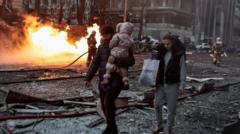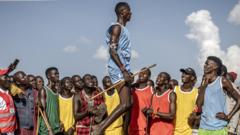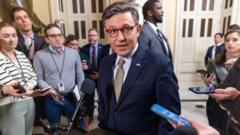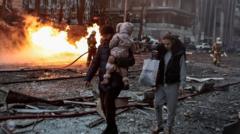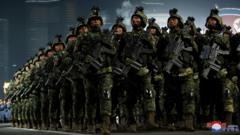The Pentagon's confirmation of North Korean troop involvement in the Ukraine war leads to significant geopolitical implications, affecting both the Asia-Pacific and Western nations.
North Korean Troops Reported to Suffer Casualties in Ukraine War

North Korean Troops Reported to Suffer Casualties in Ukraine War
Amid rising tensions, North Korean forces reportedly face their first casualties while fighting alongside Russia in Ukraine, raising the stakes in the ongoing conflict.
The Pentagon has reported that North Korean soldiers who were sent to assist Russia in its conflict against Ukraine have encountered their first combat casualties. U.S. Air Force Major General Pat Ryder stated on Monday that these troops engaged in combat in the Kursk region, an area where Russia has sought to reclaim territory from Ukraine following a surprise offensive launched by Ukraine back in August.
In a statement, General Ryder indicated that “we do assess that North Korean soldiers have engaged in combat in Kursk,” confirming reports that they have sustained both fatalities and injuries. According to Ukraine’s military intelligence agency, over the weekend, at least 30 North Korean soldiers were killed or wounded in various frontline locations, including the Russian villages of Plekhovo, Vorozhba, and Martynovka; however, these claims remain unverified by independent sources.
The involvement of North Korean forces in the Ukraine conflict represents a considerable escalation, as the implications extend beyond the immediate region, influencing dynamics in Asia and the Western world. In response to Russia’s recruitment of North Korean troops, President Biden approved the use of American long-range missiles by Ukraine against selected military targets within Russia, a decision taken just a month prior.
Earlier this year, leaders from Russia and North Korea, Vladimir Putin and Kim Jung-un, reaffirmed their mutual defense commitments, showcasing a partnership that has evolved since the Cold War. Concerns regarding the movement of North Korean troops to Russia were initially raised by Ukraine and South Korea as early as mid-October. In November, General Ryder confirmed that approximately 10,000 North Korean soldiers had been deployed from eastern Russia to the conflict zone in Kursk, situated near the Ukrainian border.
This latest development marks a significant milestone in the involvement of North Korea in the Russia-Ukraine conflict, underscoring potential shifts in military strategies and the broader international repercussions. Ukraine’s President Volodymyr Zelensky recently stated that Russia had begun deploying North Korean soldiers in greater numbers, suggesting that their operational use might expand to other areas along the front line.
In a statement, General Ryder indicated that “we do assess that North Korean soldiers have engaged in combat in Kursk,” confirming reports that they have sustained both fatalities and injuries. According to Ukraine’s military intelligence agency, over the weekend, at least 30 North Korean soldiers were killed or wounded in various frontline locations, including the Russian villages of Plekhovo, Vorozhba, and Martynovka; however, these claims remain unverified by independent sources.
The involvement of North Korean forces in the Ukraine conflict represents a considerable escalation, as the implications extend beyond the immediate region, influencing dynamics in Asia and the Western world. In response to Russia’s recruitment of North Korean troops, President Biden approved the use of American long-range missiles by Ukraine against selected military targets within Russia, a decision taken just a month prior.
Earlier this year, leaders from Russia and North Korea, Vladimir Putin and Kim Jung-un, reaffirmed their mutual defense commitments, showcasing a partnership that has evolved since the Cold War. Concerns regarding the movement of North Korean troops to Russia were initially raised by Ukraine and South Korea as early as mid-October. In November, General Ryder confirmed that approximately 10,000 North Korean soldiers had been deployed from eastern Russia to the conflict zone in Kursk, situated near the Ukrainian border.
This latest development marks a significant milestone in the involvement of North Korea in the Russia-Ukraine conflict, underscoring potential shifts in military strategies and the broader international repercussions. Ukraine’s President Volodymyr Zelensky recently stated that Russia had begun deploying North Korean soldiers in greater numbers, suggesting that their operational use might expand to other areas along the front line.





